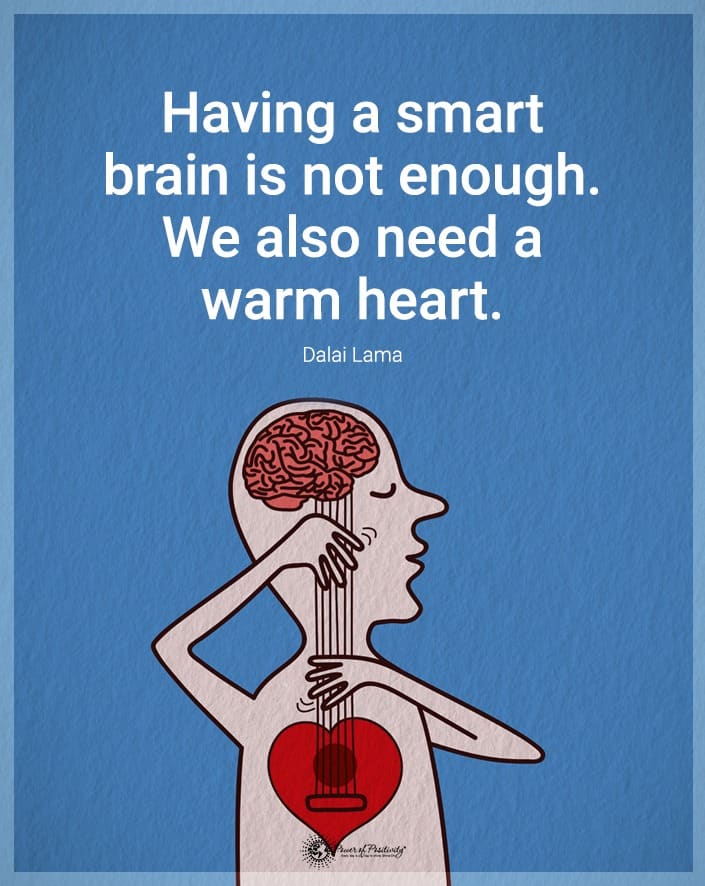Emotional intelligence is a trait that allows people to understand, process, and manage their emotions. This intuitive behavior also extends to the understanding of the emotions of others. It will enable emotionally intelligent people to empathize with those in different situations.
Many people highly value this skill because it makes for better relationships, self-esteem, and health. If you love this trait, too, you may want to increase your emotional intelligence. To begin, why not emulate some of the habits of those you admire? Here are ten habits of emotionally intelligent people never to ignore.
1. Emotionally Intelligent People Don’t Run From Difficult Emotions
A lot of people are intimidated by complex and challenging feelings. It’s not unusual to feel the urge to run from them. But emotionally intelligent people resist that urge because:
- The brain learns from how you handle various situations. If you run from your feelings, your brain learns to continue the cycle of avoidance.
- Running from emotions tells your brain that emotions are dangerous. You’ll start having complex feelings about complex emotions, and that’s even harder to deal with!
- Avoiding emotions is a form of repression. Repressing emotion worsens physical and mental health while making the feelings more potent, according to studies.
- The more you avoid difficult emotions, the more they bury into your subconscious and dictate your behavior in ways that are difficult to detect.
- Bad feelings don’t indicate dire realities. Processing emotions allows for a more realistic approach to these difficult emotions.
Emotionally intelligent people learn to accept how they feel. They don’t avoid complex emotions because they want their brain to feel safe expressing and experiencing them. The short-term negative emotion promotes long-term health, learning, and acceptance!
2. They Don’t Make Assumptions or Jump To Conclusions
Human beings are often very impatient. We want to get information quickly and continuously fill in gaps rapidly. As such, we rush to make assumptions to complete blanks, but often at the cost of accuracy.
Worse still, the way we fill the gaps with assumptions is often fueled by numerous personal issues. Have you ever noticed that the conclusions you’ve leaped to are never positive whenever you jump to conclusions? That’s because that “jump” comes from insecurities, fears, biases, and other irrational assumptions.
This is why emotionally intelligent people don’t make assumptions or jump to conclusions. Emotionally intelligent people try to be graceful, take things in good faith, and be patient in collecting information. They don’t want to deal with distorted facts. They want the truth! This is primarily because:
- Distorted assumptions can become a self-fulfilling prophecy. The more you fear something, the more you encourage it to happen.
- Emotional reactivity will continually worsen a situation, even if it is a bad situation, to begin with. If things are as bad as they initially appear on the surface, you need your head level to manage them.
- Many other people’s actions don’t have anything to do with you directly and are instead a mark of their projection. As such, using your insecurities to fuel assumptions will miss the mark.
3. Emotionally Intelligent People Know How to Regulate Emotions
Emotional regulation is a necessary part of emotional intelligence. Studies show that being able to understand, process, and manage emotions is a mark of emotionally intelligent people. It’s also something that you can learn as a skill over time.
Someone with high emotional intelligence will feel their emotions, then analyze them. They will let go of any feelings that don’t serve them well and learn to control their emotions. This allows them to avoid destructive emotional behavior and increases their kindness to themself.
4. They Know How To Analyze And Let Go Of Unhelpful Thoughts
You now know that emotionally intelligent people regulate emotions and release unhealthy ones. But did you know that they do this with unhelpful thoughts, too? A lot of emotions can be traced back to negative thought patterns.
Instead of immediately validating these thoughts, a person with high EQ will look at the situation with objective eyes. They’ll identify the ideas and analyze them to see if they’re grounded in reality.
The fact is that not all thoughts are productive, and emotionally intelligent people know that. They, for example, will release their thoughts if:
- The thoughts unproductively repeat themselves repeatedly, becoming worry-filled ruminations with no solution.
- They cannot control the outcome of their thoughts, and therefore thinking more about it won’t help.
- Their thoughts begin to affect their everyday lives, function, and health.
To accomplish this, an emotionally intelligent individual will:
- Practice mindfulness and nonjudgmental observation of their thoughts.
- Maintain control over their thoughts and not allow those thoughts to control them.
- Learn to develop an awareness of their ideas to avoid repression or ignorance.
5. They Understand How Others Feel
Emotionally intelligent people are often highly empathetic, say studies. Whether that empathy is natural or cognitive, they learn to understand the feelings of others better. Even if they can’t directly relate to a situation, they’re able to walk a mile in other people’s shoes. They can do this because:
- They practice their social skills to improve their empathy for others gradually. This gives them the chance to learn how to respond to the various emotions of others.
- They listen actively and aim to listen well when others talk about their emotions. They don’t have an interest in preparing responses instead of trying to understand others. Their goal is to focus on the speaker, empathize with them, and eventually respond mindfully and with kindness.
- They learn to discern nonverbal communication. This indicator includes expressions, body language, tone, and other cues. This allows them to gain information about others’ emotions without directly being told.

6. Emotionally Intelligent People Manage Conflict Well
Conflict can be a source of strife and frustration in interpersonal relationships. Emotionally intelligent people learn to manage conflict very well. They achieve this because:
- They don’t get defensive when someone’s point of view disagrees with theirs. They’re able to validate the points of view of others, even when they don’t share that perspective. They’re able to express themselves and be assertive without being defensive.
- They seek common ground with others, trying to find win-win situations and compromises. They want to establish a common goal, so no one feels like a “loser” in conflict. Thus, they are graceful and fair.
- They listen to negative feedback positively. They know they’re not perfect and will listen when others point out their errors. This doesn’t mean they accept all feedback as worthy of internalizing. They know how to be graceful in receiving feedback with confidence.
- They discuss things calmly, clearly, and objectively without letting frustration or the need to be “right” drive them. Emotionally intelligent people don’t become patronizing, angry, or condescending when discussing conflict, so they don’t lash out.
7. They Don’t Let Their Emotions Compromise Their Values
Emotionally intelligent people have confidence in their values. They know what they believe in and what matters to them. They don’t put an extreme value of authenticity in emotion, knowing that their values and desires are all just as genuine regardless of feeling.
This isn’t to say that those with high emotional intelligence never have moments of weakness. Nor does it mean that they ignore their feelings and focus on pure rationality, like robots. Instead, it means that appeals to their non-objective sides won’t work. They don’t allow themselves to be swayed by strong emotions, no matter how tempting that may be. Their decisions need to be made based on their goals and beliefs, not exclusively on how something makes them feel.
8. Emotionally Intelligent People Positively Express Their Emotions
Emotionally intelligent people aren’t just capable of understanding and analyzing their feelings. They also know how to appropriately express them, according to studies. They don’t feel ashamed about their emotions and don’t allow the feelings to fester or twist. As such, they won’t lash out at others. Instead, they’ll positively express their feelings by:
- Writing in a journal.
- Talking to loved ones after requesting permission to vent.
- Releasing tension through exercise and hobbies.
- Seeking professional help when necessary.
- Reflecting on their emotions and developing plans to improve their reactions to them.
- Validating their emotions to themselves and giving themselves space to feel each complexity.
9. They Set Boundaries
Emotionally intelligent people are often seen as pushovers, but this isn’t the case. Despite their high levels of empathy and understanding, they don’t forget about the importance of boundaries. This means that they insist on the following:
- Rejecting poor treatment from others.
- Communicating their need for space and me-time.
- Not confusing other people’s emotions with their own.
- Disconnecting from toxic people who try to take advantage of them.
- Knowing never to take things personally when it’s not personal.
- Being assertive in maintaining and enforcing their boundaries and values.
- Remaining polite but firm and won’t let anyone push them around.
- Not making enemies out of people, preferring to set limits instead.
These boundaries are endlessly crucial for people with high emotional intelligence to maintain mental health. They have to protect themselves from the natural strain of empathy and caring for others. It’s something everyone could stand to learn, too!
10. Emotionally Intelligent People Use Self-Compassion When They Make Mistakes
You’ve heard about how emotionally intelligent people release negative thoughts, regulate their feelings, and do all sorts of good things. But that doesn’t make them infallible! They’re still human beings with flaws and struggles. They’re going to make mistakes, and they know this.
But their emotional intelligence shines through in the way they handle their mistakes. They utilize self-compassion with themselves to better learn, regulate, and process these errors. They do so by:
- Refraining from self-critical, negative talk.
- Focusing on learning from their mistakes for further growth.
- Understanding that failure is ordinary and necessary.
- Giving themselves a break and encouraging themselves to be better.
- Removing self-pity from the equation and being objective and rational.
- Requesting feedback from others.
- Being grateful for their chances to learn from mistakes.
- Understanding that the past cannot be changed.
Emotionally intelligent people will also take responsibility for their mistakes. They acknowledge the truth of their errors, apologize if they hurt others, and strive to be better. Their focus remains on improvement for the future, not on punishing themselves for the past.
Final Thoughts On Some Habits Of Emotionally Intelligent People To Never Ignore
You can learn how to be one of those emotionally intelligent people you admire over time. If you want to become one of those few, do your best to emulate these ten habits! You’ll learn a lot about yourself, your emotions, and the people around you as you grow and improve for the better.
The post 10 Habits of Emotionally Intelligent People Never to Ignore appeared first on Power of Positivity: Positive Thinking & Attitude.








